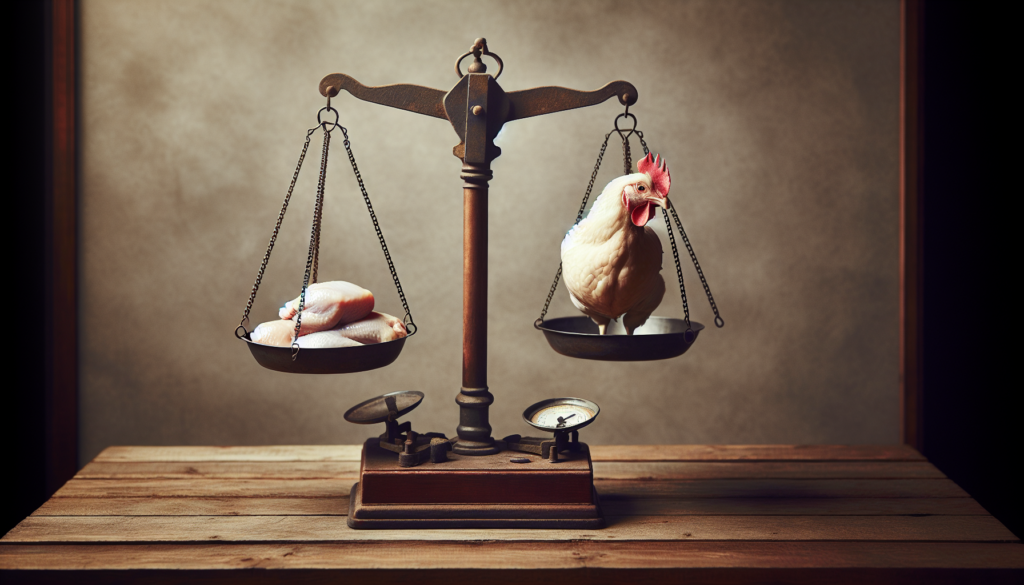If you’re concerned about the ethical handling and processing of chickens for meat, you’re not alone. Many individuals like you are seeking ways to ensure that the chickens they consume have been treated humanely throughout their lives. In this article, we will explore some practical steps you can take to support ethical practices in the poultry industry. From understanding labeling standards to choosing sustainable sources, we’ve got you covered on your journey to make more conscious choices when it comes to your chicken consumption. Let’s dive in and learn how you can ensure ethical handling and processing of chickens for meat.
Understanding Ethical Handling and Processing of Chickens for Meat
When it comes to the handling and processing of chickens for meat, ethical practices play a crucial role. Ethical handling and processing involve treating chickens with respect, ensuring their well-being, and minimizing their suffering throughout their lives. These practices are not only important from an animal welfare standpoint, but they also contribute to the overall quality and safety of the meat produced. By understanding what ethical handling and processing entail, we can make informed choices as consumers and contribute to a more humane and sustainable poultry industry.
Defining Ethical Handling and Processing
Ethical handling and processing refer to the practices and protocols implemented to ensure the well-being and humane treatment of chickens throughout their lives, from birth to slaughter. It includes considerations such as providing proper nutrition, maintaining appropriate living conditions, implementing low-stress handling techniques, and using slaughter methods that minimize suffering. These practices prioritize the chicken’s welfare and aim to minimize any potential harm or distress they may experience.
Importance of Ethical Treatment of Chickens
Treating chickens ethically is not only a moral responsibility but also has significant implications for the quality of the meat produced. Chickens that are raised in stressful and inhumane conditions are more prone to diseases and infections. Unhealthy and stressed birds are more likely to require antibiotics, which can have adverse effects on both the chickens and consumers. By ensuring ethical treatment, we can promote healthier birds and safer meat products, benefiting both the animals and consumers.
Common Unethical Practices in the Industry
Unfortunately, the poultry industry has been marred by a number of unethical practices. Some common examples include overcrowded and unsanitary living conditions, improper nutrition, overuse of antibiotics, and inhumane slaughter methods. Battery cages, where chickens are confined in small wire enclosures, are still used in some intensive farming operations, causing immense physical and psychological distress to the birds. These practices compromise the welfare of the chickens and contribute to the overall negative image associated with the industry.
Implementing Ethical Handling Practices
To ensure ethical handling of chickens for meat, it is essential to implement certain practices throughout their lives. These practices prioritize the welfare of the chickens and promote their overall well-being.
Choosing Reputable Suppliers and Farms
One of the first steps in ensuring ethical handling is selecting reputable suppliers and farms that prioritize animal welfare. Look for farms that have certifications and labels indicating their commitment to ethical practices. Research the suppliers’ practices and visit the farms if possible to assess their conditions first-hand. By choosing suppliers who prioritize ethical handling, you are supporting responsible farming and sending a message to the industry that these practices are important to consumers.
Ensuring Humane Living Conditions
Chickens should be provided with optimal living conditions that prioritize their welfare. This includes adequate space to move and stretch their wings, clean and comfortable bedding, proper ventilation, and access to natural light. Avoid farms that use battery cages or other confinement systems that restrict the chickens’ movement and lead to stress and injuries.
Providing Proper Nutrition and Healthcare
Proper nutrition is vital for the well-being of chickens. Ensure that the birds have access to a balanced and nutritious diet that meets their specific nutritional requirements. Regular veterinary care should also be provided to monitor the health of the chickens and address any medical issues promptly. This includes routine vaccinations, parasite control, and regular health check-ups to prevent the spread of diseases and ensure early detection and treatment.
Implementing Low-Stress Handling Techniques
Chickens are sensitive animals that can easily become stressed. Implementing low-stress handling techniques is crucial to minimize fear and discomfort. This includes using quiet and calm handling methods, avoiding sudden movements or loud noises, and providing sufficient resting time and access to clean water. Training staff members on proper handling techniques is essential to ensure the chickens’ well-being and minimize their stress levels.
Ensuring Ethical Processing Methods
Ethical processing methods are equally important to uphold the welfare of chickens during the slaughter process. These methods focus on minimizing suffering and ensuring that chickens are treated with respect and dignity.
Selecting Slaughter Methods that Minimize Suffering
The selection of slaughter methods is critical in ensuring ethical processing. It is important to choose methods that are designed to minimize suffering and provide a quick and painless death. Some commonly accepted methods include electrical stunning, controlled atmosphere stunning, or mechanical stunning. These techniques induce unconsciousness and ensure that the chickens do not experience unnecessary pain or distress during the slaughter process.
Avoiding Live-Plucking and Force-Feeding
Live-plucking, the practice of plucking feathers from live chickens, and force-feeding, the practice of overfeeding chickens for foie gras production, are highly unethical and should be avoided. These practices cause immense suffering and are inhumane. Ensure that the meat products you consume do not support or promote these unethical practices.
Implementing Proper Stunning Techniques
Stunning is a critical step in the slaughter process as it renders the chickens unconscious before the actual killing takes place. Implementing proper stunning techniques ensures that the chickens do not feel pain or distress during slaughter. Control and monitoring of stunning equipment, training of staff members, and regular monitoring of stunning effectiveness are essential to ensure humane processing.
Using Certified Organic and Free-Range Processing Facilities
Certified organic and free-range processing facilities adhere to strict guidelines and regulations that prioritize animal welfare. These facilities ensure that the chickens have access to outdoor space, are not subjected to unnecessary stress, and are handled in a humane manner. Choosing products processed in certified organic and free-range facilities helps support ethical handling and processing practices.
Securing Transparency and Accountability
Transparency and accountability play a crucial role in ensuring ethical handling and processing. By holding the industry accountable and promoting transparency, we can encourage responsible practices and identify areas for improvement.
Performing Regular Audits and Inspections
Regular audits and inspections should be conducted throughout the poultry industry to ensure compliance with ethical handling and processing standards. Independent third-party auditors can assess farms and processing facilities, ensuring they meet required guidelines and regulations. These audits serve as a mechanism to identify potential areas of improvement and address any issues promptly.
Certifications and Labeling for Ethical Products
Certifications and labeling for ethical products are essential tools for consumers to make informed choices. Look for labels such as Animal Welfare Approved, Certified Humane, or USDA Organic, as they guarantee that specific animal welfare standards have been met. These labels provide reassurance and enable consumers to support producers who prioritize ethical practices.
Encouraging Consumer Awareness and Activism
Consumer awareness and activism play a vital role in driving change within the poultry industry. By staying informed about the issues surrounding ethical handling and processing, consumers can make conscious choices and support ethical brands. Supporting campaigns and organizations that advocate for animal welfare and responsible farming practices can also create a collective voice and put pressure on the industry to improve its practices.
Addressing Public Health and Safety
Ethical handling and processing practices not only benefit the chickens but also have implications for public health and safety. By prioritizing biosecurity measures, monitoring disease prevalence, and implementing strict sanitation practices, we can safeguard both animal and human health.
Implementing Strict Biosecurity Measures
Biosecurity measures are crucial to prevent the spread of diseases and ensure the health of the chickens. This includes implementing protocols to control access to the farm, preventing contact with wild birds or pests, and maintaining proper hygiene and cleanliness in the facilities. Strict biosecurity measures are essential to minimize the risk of disease outbreaks and protect both the chickens and consumers.
Monitoring for Diseases and Antibiotics Usage
Regular monitoring for diseases is essential to identify and address health issues promptly. By monitoring disease prevalence, farms can take appropriate measures such as targeted vaccinations or isolation of infected birds to prevent the spread of the disease. Additionally, responsible antibiotic usage should be ensured, avoiding the overuse or misuse of antibiotics to minimize the development of antibiotic resistance.
Proper Sanitation and Hygiene Practices
Proper sanitation and hygiene practices are essential to maintain a clean and safe environment for the chickens. Regular cleaning and disinfection of the facilities, proper waste management, and rigorous hand hygiene protocols should be implemented to prevent the spread of pathogens. These practices contribute to the overall health and safety of the chickens and the meat they produce.
Supporting Ethical Legislation and Policies
Advocating for animal welfare laws and standards is an important step in ensuring ethical handling and processing practices are upheld throughout the industry. By supporting initiatives for responsible farming practices and encouraging the implementation of strict regulations and penalties for non-compliance, we can contribute to creating a more ethical poultry industry.
Advocating for Animal Welfare Laws and Standards
Supporting the implementation of animal welfare laws and standards at local, national, and international levels is crucial. These laws define the minimum acceptable standards for the treatment and handling of animals, including chickens raised for meat. By advocating for stronger regulations and ensuring their enforcement, we can make significant strides towards improving the welfare of chickens in the poultry industry.
Supporting Initiatives for Responsible Farming Practices
Initiatives that promote responsible farming practices, such as sustainable farming methods, reduced antibiotic usage, and improved animal welfare, should be actively supported. These initiatives encourage farmers to adopt ethical practices and provide the necessary resources and training to implement these practices effectively. By supporting such initiatives, we can drive positive change in the poultry industry and foster a more ethical and sustainable approach.
Collaboration and Industry Partnerships
Collaboration and partnerships within the poultry industry are vital for achieving significant and widespread improvements in ethical handling and processing practices. By engaging in dialogue with industry stakeholders, sharing best practices, and conducting research, we can work together towards a more humane and sustainable future.
Working with Animal Welfare Organizations
Partnering with animal welfare organizations can provide valuable expertise and guidance in implementing ethical handling and processing practices. These organizations often have extensive knowledge and experience in promoting animal welfare and can assist in developing industry-wide standards and guidelines. By collaborating with these organizations, we can benefit from their expertise and work together towards better practices.
Engaging in Dialogue with Industry Stakeholders
Engaging in open and constructive dialogue with industry stakeholders, including farmers, processors, and retailers, is essential for driving change. By sharing knowledge, experiences, and challenges, we can collectively identify areas for improvement and implement meaningful and practical solutions. This collaboration fosters a culture of continuous improvement and creates an environment where ethical handling and processing practices can thrive.
Sharing Best Practices and Research Findings
Sharing best practices and research findings is fundamental to advancing ethical handling and processing in the poultry industry. By exchanging knowledge and experiences, we can learn from each other and identify successful practices that can be replicated. Research findings on animal welfare, sustainable farming methods, and innovative technologies can help drive innovation and improve practices across the industry.
Consumer Choices for Ethical Meat
Consumers have a significant role to play in promoting ethical handling and processing practices in the poultry industry. By making conscious choices and supporting ethical brands, we can send a strong message to the industry that animal welfare is a priority.
Looking for Ethical Labels and Certifications
When purchasing chicken meat, look for labels and certifications that indicate ethical handling and processing. Labels such as Animal Welfare Approved, Certified Humane, or USDA Organic are good indicators that the product meets specific animal welfare standards. These labels provide assurance that the chickens were raised and processed using ethical practices.
Opting for Organic, Free-Range, and Pasture-Raised Products
Organic, free-range, and pasture-raised products often adhere to higher animal welfare standards. These animals typically have better living conditions and are given access to outdoor spaces, allowing them to exhibit natural behaviors. Choosing these products supports ethical handling and processing practices and promotes a more sustainable and humane poultry industry.
Exploring Alternative Protein Sources
Exploring alternative protein sources is another way to reduce the demand for conventionally raised chicken meat. Plant-based protein alternatives such as legumes, tofu, or tempeh offer a cruelty-free and sustainable option. By incorporating more plant-based protein into your diet, you can support ethical choices and contribute to a more sustainable food system.
Educating and Training Poultry Farmers
Education and training play a crucial role in promoting ethical handling and processing practices within the poultry industry. By providing farmers with the necessary knowledge, resources, and support, we can empower them to implement and improve their practices.
Providing Workshops and Educational Resources
Organizing workshops, training sessions, and educational resources specifically tailored for poultry farmers can help them understand and implement ethical handling and processing practices. These resources can cover topics such as animal welfare, biosecurity, proper nutrition, low-stress handling techniques, and slaughter methods that minimize suffering. Ongoing training and access to updated educational materials equip farmers with the knowledge to make informed and ethical decisions.
Promoting Ethical Guidelines and Protocols
Developing and promoting ethical guidelines and protocols within the poultry industry sets a clear standard for responsible practices. These guidelines should outline best practices for all aspects of chicken handling and processing, including nutrition, housing, handling, and slaughter. Promoting and providing guidance around ethical protocols ensures that farmers have a framework to follow and can continuously strive for improvement in their practices.
Supporting Continuous Improvement Initiatives
Encouraging continuous improvement initiatives within the poultry industry is crucial for maintaining ethical standards. These initiatives can include research projects, pilot programs, and collaboration between farmers to identify and implement best practices. Financial and technical support provided to farmers and industry stakeholders can drive and incentivize the adoption of ethical handling and processing practices.
The Role of Government and Regulatory Bodies
Government and regulatory bodies play a vital role in ensuring ethical handling and processing practices are upheld across the poultry industry. By establishing and enforcing regulations, investing in research, and monitoring compliance, they contribute to the overall welfare of chickens and the safety of the meat produced.
Enforcing and Strengthening Animal Welfare Regulations
Government bodies should enforce and strengthen animal welfare regulations to ensure the ethical treatment of chickens within the poultry industry. These regulations should set clear standards for living conditions, handling practices, and slaughter methods. Regular inspections and penalties for non-compliance should also be part of the enforcement framework to ensure accountability.
Establishing Penalties for Non-Compliance
Penalties for non-compliance with ethical handling and processing regulations are crucial to deter unethical practices. These penalties should be significant enough to act as a deterrent and to encourage compliance with established standards. Strict enforcement of penalties sends a clear message that unethical practices will not be tolerated and promotes a more responsible and humane industry.
Investing in Research and Development
Government investment in research and development is essential to drive innovation and advance the understanding of ethical handling and processing methods. Research projects can focus on improving animal welfare, developing new technologies, and identifying sustainable farming practices. By providing funding and support for such initiatives, governments can contribute to the overall improvement of the poultry industry.
In conclusion, ensuring the ethical handling and processing of chickens for meat is a collective responsibility. By understanding the importance of ethical treatment, supporting responsible farming practices, and making informed consumer choices, we can contribute to a more humane and sustainable poultry industry. Collaboration between farmers, industry stakeholders, government bodies, and consumers is essential to drive change and prioritize the welfare of chickens throughout their lives. Together, we can create an industry that places animal welfare at the forefront and ensures the production of safe, high-quality, and ethically sourced chicken meat.




